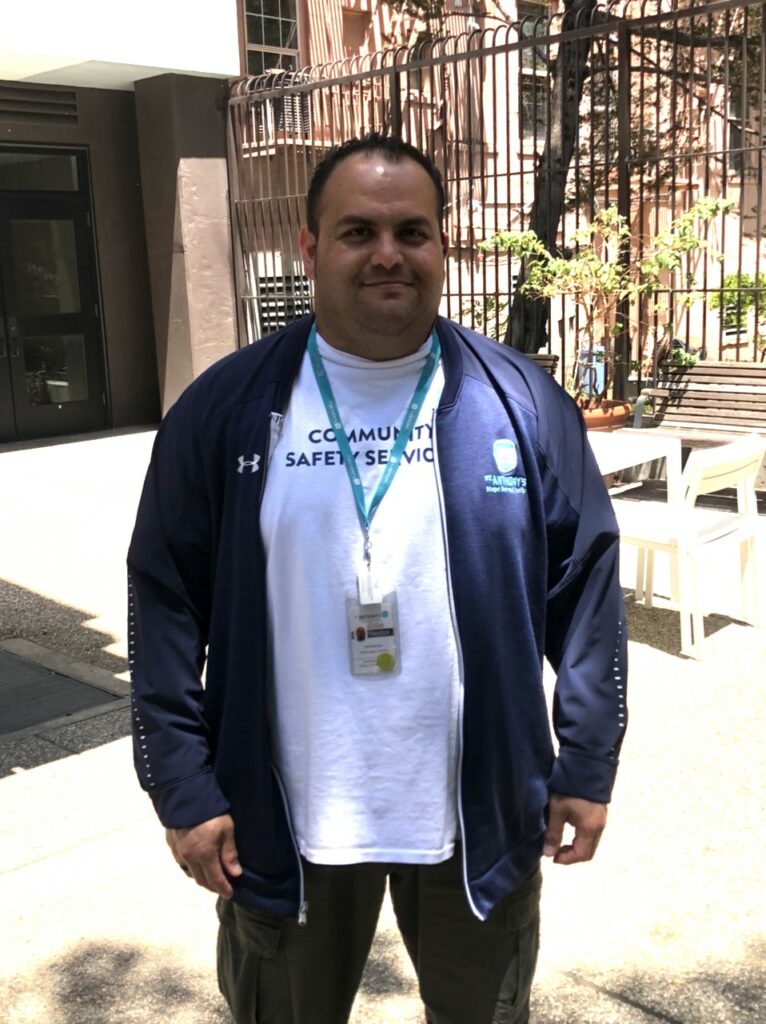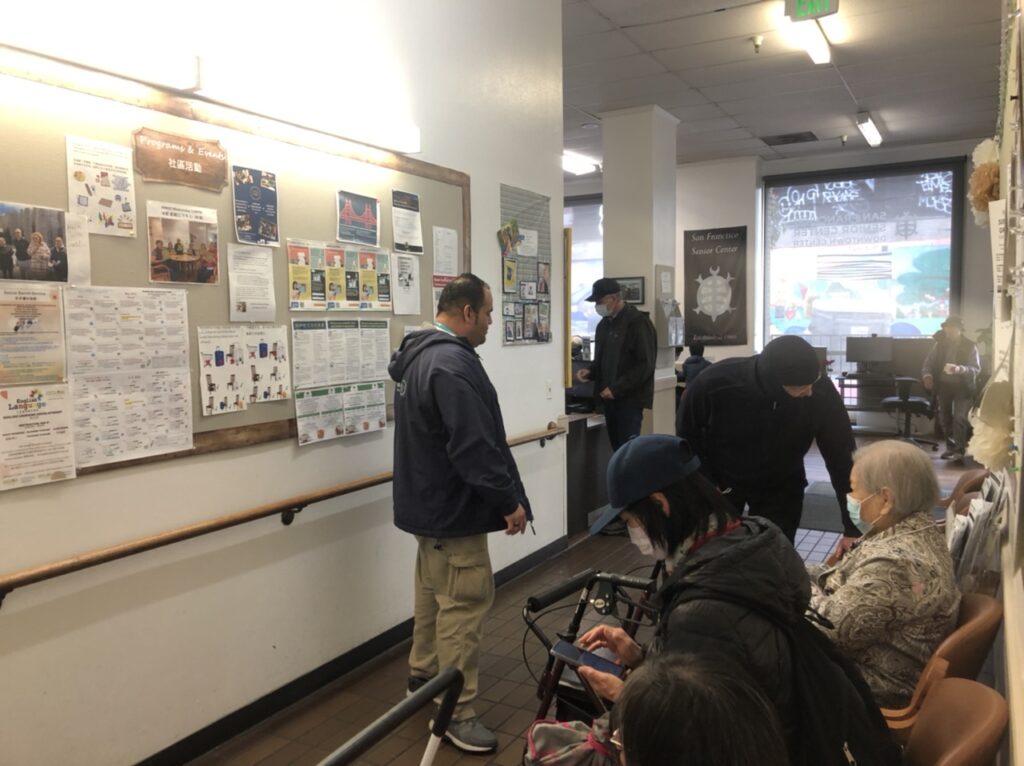St. Anthony’s Community Safety Services Team: To Keep San Franciscans Safe, This Team Uses Compassion Instead of Force
July 11, 2023

Nestor Batres, an Oakland resident born in El Salvador, has learned a great deal while working for the same employer for over a decade. The most critical part of his job, however, is compassion.
Nestor is a part of Community Safety Services at St. Anthony Foundation, a team tasked with maintaining safety in and around St. Anthony’s programs and contracted partner sites. These men and women interact with St. Anthony guests and the local residents and passersby. They give directions, recommend free services, defuse the sometimes-dangerous situations and even save lives during medical and psychiatric emergencies.
In addition to the 33 team members who work directly for St. Anthony’s, 25-35 more employees are contracted with the city’s social service organizations as part of St. Anthony’s Social Enterprise program. You’ll find them at Larkin Street Youth Services, San Francisco’s largest nonprofit provider for young people experiencing homelessness. They’re posted at women’s shelters, senior centers and substance detox facilities across the Tenderloin, the SoMa neighborhood and the Mission District, where the most vulnerable city residents turn to for healing and hope.
Nestor, for example, spent the last five years at the San Francisco Senior Center Downtown branch at 481 O’Farrell Street. There, he quickly realized he enjoys working with the older population.
“I try to make them feel welcome,” says Nestor. “They’re used to having security [guards] here and they think oh, it’s security guards, they’re here for force.” But as Nestor strikes up conversations, the center’s visitors realize he has good will and wants to build rapport. “Everybody talk with me. I am not here for start problem, I’m here for protect they [sic],” Nestor says.
“The day I started working here, I tried to remember everybody’s name. I started to introduce myself with pretty much everybody,” remembers Nestor. “I talk to them about their lives. Most people come here because they don’t have a place to go. They like coming here and play bingo, ping pong.”
Nestor takes relationship-building seriously. He knows everyone who comes through these doors and notices when an older guest is gone for some time, which worries him to no end. His job has made him more open-minded and helped him relate to his own parents, who are in their seventies. His father and mother, who recently had cancer, live back in El Salvador.
“I don’t want to mix in my feelings,” he says. “Work is work, but sometimes when you work with seniors and you have your parents, you worry more.”
One morning, Nestor found a tent encampment in front of the Senior Center building. He walked over to the occupants and politely asked them to move across the street. They complied. “I have to get that relationship with those people because I hear everybody,” he says.
Sometimes people on the street ask him for coffee and Nestor will get them coffee. Someone else broke their umbrella; Nestor got them another one. A woman showed up at the Senior Center in the rain without socks. So Nestor found her socks. “Now we say good morning to each other. Don’t judge people just how they look because everybody has a history. If somebody has any issue and come to me and try to fix that problem, I can help.”
The center guests say they feel safer, too, like San Francisco resident Elizabeth “Elle” Cumbie, a regular at two local senior centers.
“They’re great places: they have Project Open Hand with food for seniors, and they have a lot of activities for seniors to socialize,” says Elle, who worked as a legal secretary for 43 years before getting sick and losing her home for some time.
Since St. Anthony’s Community Safety Services came on board at her senior centers, Elle noticed a whole different environment. “They really specialize in knowing how to handle things that happen in this neighborhood. They’re here to help and they can de-escalate it and they can calm it down. Nobody gets hurt.”
Meanwhile, Community Safety Services employee Andrew Rutherfurd realized that one of his strengths is working with individuals with developmental and intellectual disabilities.

Recently, Andrew was assigned to work at The Arc San Francisco in SoMa, an organization serving adults with developmental disabilities and providing life skills education, job training, advocacy and events like game and movie nights.
“I’ve never shied away from approaching people who were having a psychotic [episode],” says Andrew. “And in doing that I would develop a relationship with them over time. There were many instances where I understood that I was the wrong person to talk to a certain individual if they were feeling a certain way. And other times I was very much the right person to talk to because we already had a rapport.”
Andrew is skilled at rerouting conversations in a direction that’s more personal, even humorous, if needed. He does not address individuals in a patronizing way. “It’s better to just be real and get to know them. If you can redirect that or take somebody off that track and put them on a different track, then I know it was important.” His de-escalation approach has prevented crises and saved people in trouble “from harming themselves or other people.”
Andrew is the first person The Arc visitors see when they come into the building and the last one they see when they leave. Some are only looking for food or clothes, in which case he sends them to St. Anthony’s for a free meal, laundry or a shower.
The Arc visitors start gathering outside the building up to an hour and a half before it opens, at 7:30 in the morning. Andrew interacts with the guests “so they don’t wander off, don’t get angry or get frustrated.” Ultimately, he tries to make them feel comfortable and welcome, Andrew says. “Nobody is an island.”













































